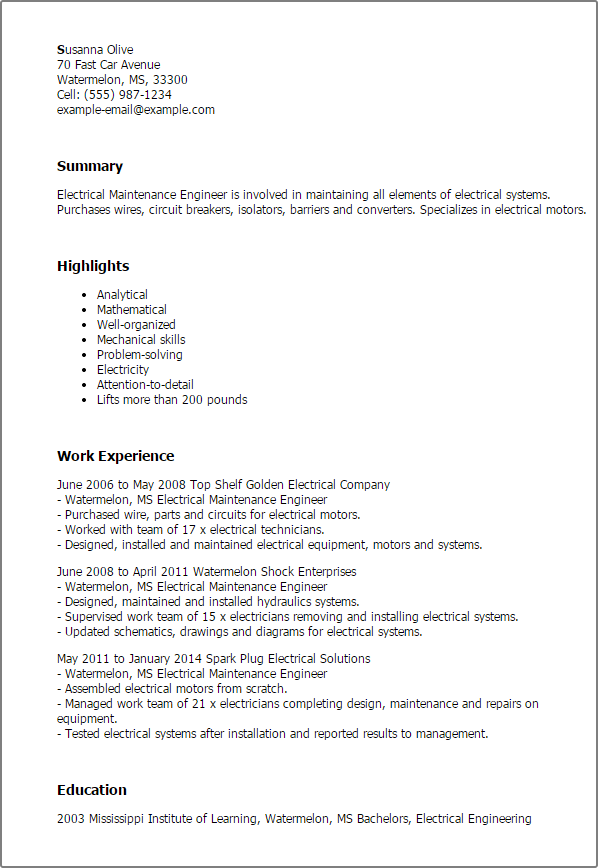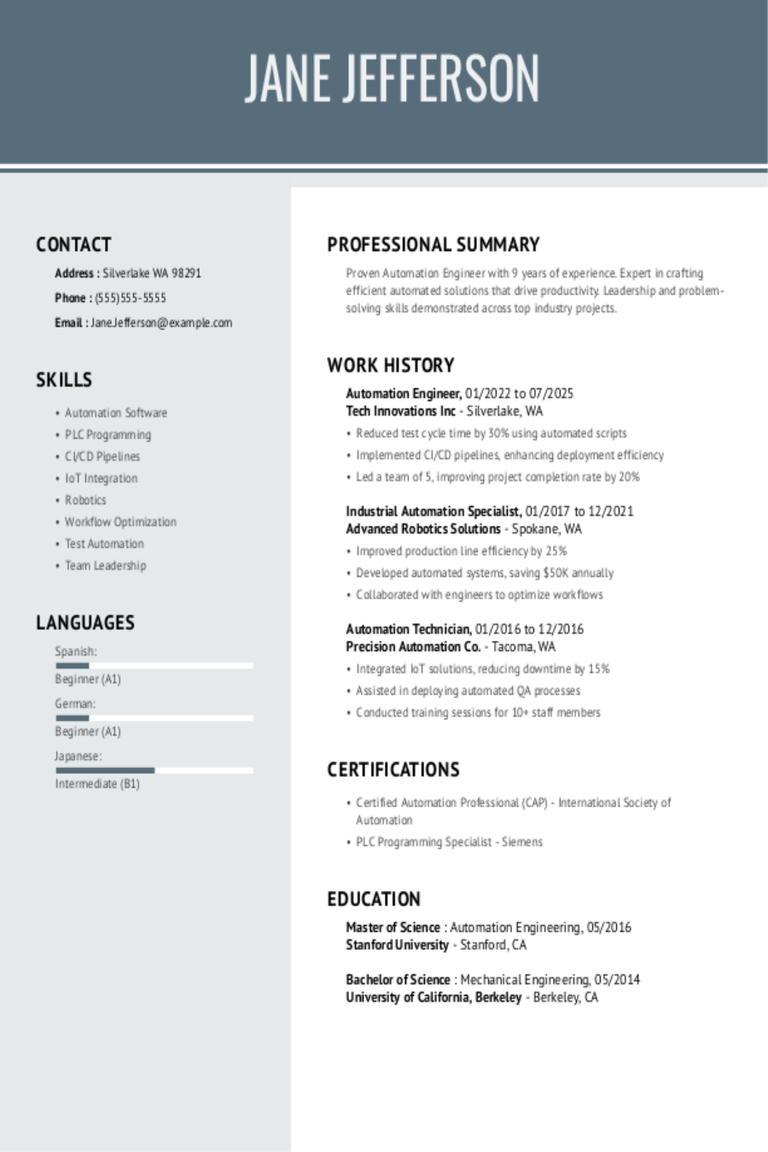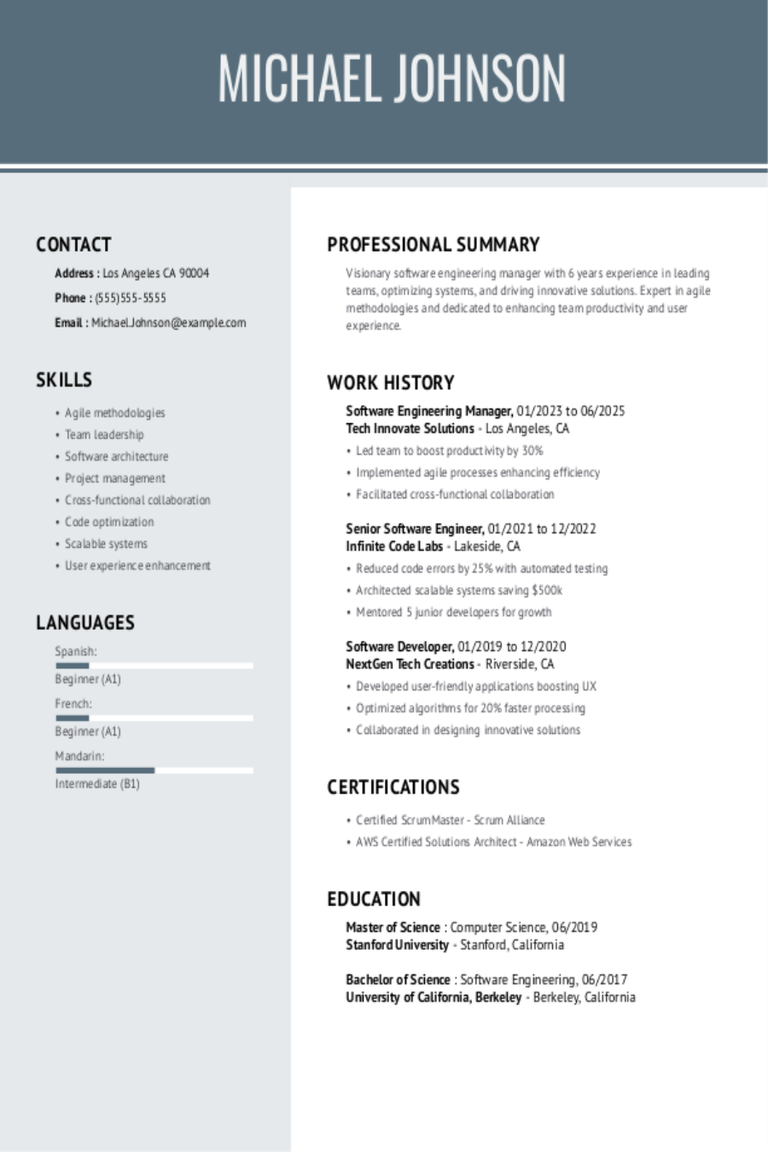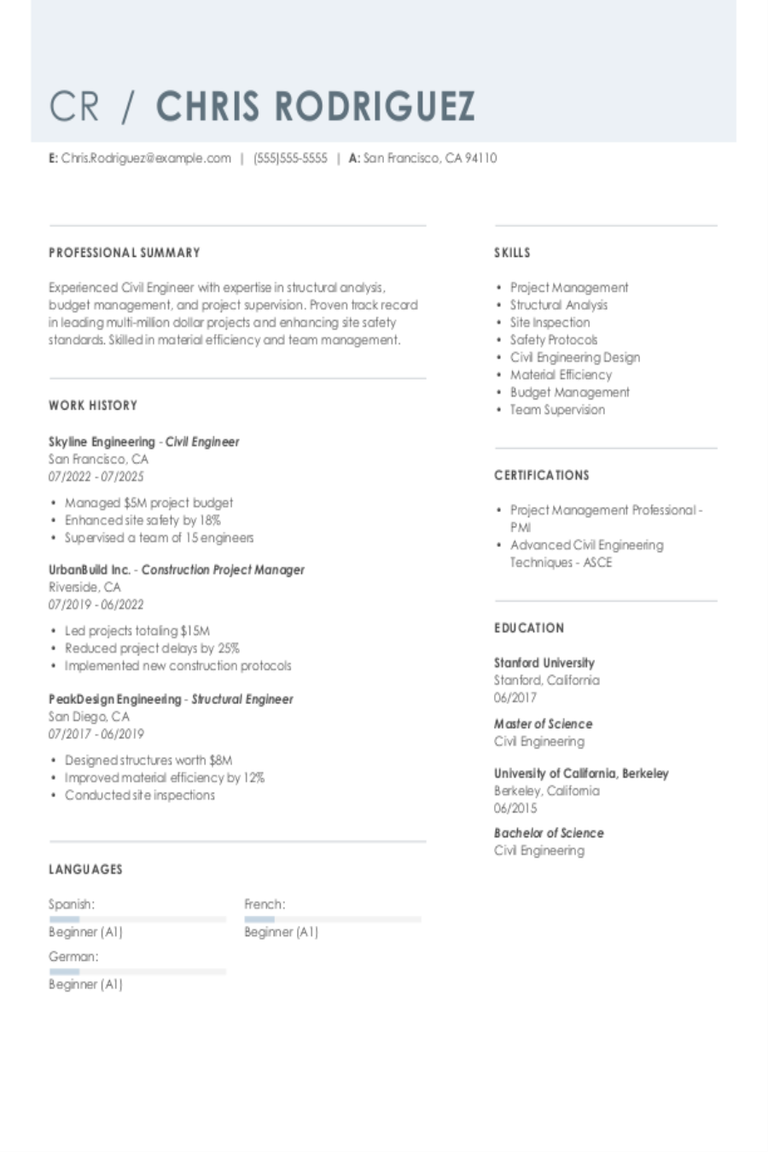Why this resume works
- Quantifies accomplishments: Achieving measurable accomplishments like reducing costs by 15% and completing projects 20% faster showcases tangible impact and value.
- Showcases career progression: Progressing from analyzing energy flows to leading teams on high-impact projects reflects a steady growth in both technical expertise and leadership responsibilities over time.
- Highlights industry-specific skills: Including skills like renewable energy systems, compliance auditing, and circuit design demonstrates a strong alignment with the specialized demands of the electrical engineering industry.
More Electrical Engineer Resume Examples
See our electrical engineer resume examples to learn how to showcase your technical skills, project management experience, and problem-solving abilities. These electrical engineering resume samples will guide you in crafting a resume that reflects industry expectations and highlights your expertise.
Entry-Level Electrical Engineer
Why this resume works
- Centers on academic background: Showcasing a master’s degree in electrical engineering from Stanford in the education section, the applicant shows academic excellence and potential for impactful contributions early in their career.
- Effective use of keywords: Strategically weaving in role-specific keywords like circuit design and energy optimization ensures the resume is optimized for applicant tracking systems (ATS).
- Puts skills at the forefront: Listing skills such as project management prominently aligns with the skills-based resume format, ideal for entry-level applicants.
Mid-Level Electrical Engineer
Why this resume works
- Displays technical expertise: The applicant’s technical expertise shines through in their ability to lead electrification design projects and develop energy-efficient system models, supported by specialized certifications and a master’s degree.
- Points to measurable outcomes: By reducing costs by 15% and improving efficiency by 20%, the applicant illustrates their knack for driving impactful, measurable changes in energy systems.
- Includes a mix of soft and hard skills: With skills ranging from circuit design to interpersonal skills, the applicant mixes technical prowess with effective communication to coordinate teams seamlessly.
Experienced Electrical Engineer
Why this resume works
- Showcases impressive accomplishments: By showcasing impactful achievements such as developing a solar project saving $1M annually, the applicant reflects significant business impact and senior-level performance.
- Focuses on work history: Using a chronological resume format, the applicant effectively emphasizes extensive career experience, highlighting progressive roles that showcase growth and expertise in electrical engineering.
- Emphasizes leadership skills: Leading a team of 10 engineers to complete projects demonstrates the applicant’s leadership skills, emphasizing their capability to manage teams and drive successful outcomes.
Electrical Engineer Resume Template (Text Version)
Jin Kim
Spokane, WA 99205
(555)555-5555
Jin.Kim@example.com
Professional Summary
Motivated Electrical Engineer with 9 years of expertise in circuit design, systems analysis, and renewable energy solutions. Proven track record of innovative project management with quantifiable cost and efficiency improvements.
Work History
Electrical Engineer
Voltage Dynamics Inc. – Spokane, WA
June 2021 – July 2025
- Reduced costs by 15% via efficient designs
- Led team to complete projects 20% faster
- Implemented safety protocols, boosting compliance
Electronics Developer
Smart Grid Solutions – Eastside, WA
March 2016 – May 2021
- Enhanced circuit designs, increased output by 10%
- Managed team to achieve timelines effectively
- Optimized processes, reducing downtime by 12%
Power Systems Analyst
RenewTech Innovations – Silverlake, WA
July 2013 – February 2016
- Analyzed energy flow, improved efficiency by 8%
- Collaborated with engineers to meet project needs
- Developed models predicting energy savings
Skills
- Circuit Design
- Project Management
- Power Systems Analysis
- Renewable Energy
- Compliance Auditing
- Team Leadership
- Efficiency Optimization
- Safety Implementation
Education
Master of Science Electrical Engineering
Stanford University Stanford, California
June 2013
Bachelor of Science Electrical Engineering
UC Berkeley Berkeley, California
May 2011
Certifications
- Certified Energy Manager – AEE Institute
- Professional Engineer – NCEES
Languages
- Spanish – Beginner (A1)
- Mandarin – Beginner (A1)
- German – Beginner (A1)
Related Resume Guides
Advice for Writing Your Electrical Engineer Resume
Explore our advice on how to write a resume specifically for an electrical engineer role and learn how to highlight your technical skills, project experience, and passion for innovation. Browse tailored tips that will help your resume stand out in the competitive engineering field.
Highlight relevant technical skills
For an electrical engineer, technical skills are essential. They demonstrate your ability to work with complex systems, tools, and technologies. Including a dedicated skills section on your resume allows employers to quickly identify your core competencies and understand how you can contribute to their team.
To make your skills even more impactful, incorporate them into your work experience descriptions. Rather than just stating responsibilities, highlight how you’ve applied your technical knowledge to solve problems, complete projects, or improve systems. This shows not only what you know, but how you’ve used your expertise in practical, results-driven ways.
When deciding which skills to feature, review the job description and focus on the technologies, tools, and areas of knowledge that are most relevant to the role. Whether it’s circuit design, control systems, or industry-standard software, tailoring your resume to match the employer’s needs helps you stand out.
Keep your skills section clean and easy to read. Using concise phrasing and thoughtful placement can make your resume more effective and demonstrate that you’re prepared to meet the technical demands of the role.
Example of a technical skills section
- Circuit design & analysis
- Electrical schematics (AutoCAD Electrical)
- Power systems engineering
- PLC programming (Siemens, Allen-Bradley)
- Embedded systems development
- SCADA systems
- Microcontroller programming (Arduino, Raspberry Pi)
- Signal processing
- Renewable energy systems
- MATLAB & Simulink for modeling and simulation
You can use our Resume Builder to craft a resume that highlights technical skills in addition to key soft skills like teamwork, communication, and adaptability.
Quantify your accomplishments
Quantifying accomplishments on your resume makes it more engaging by showing real impact rather than just listing what you did. In the work experience section, use numbers to turn duties into achievements. For an electrical engineer, instead of saying “designed circuits,” say “designed circuits that reduced power consumption by 15%.” This shows exactly what you achieved and how it benefited the company.
Using action verbs and metrics makes your resume results-driven. Words like “improved,” “increased,” or “decreased” paired with specific outcomes make it clear what you’ve accomplished.
For example, if you improved system efficiency by 20%, that’s a powerful statement of your skills as an electrical engineer. Hiring managers can quickly see how effective you are at solving problems and bringing value to their team. When hiring managers see quantified accomplishments, they immediately understand your impact and skills.
Numbers stand out in a sea of text, so they’re more likely to remember what you’ve done. This makes your resume stronger and more appealing than one filled with vague responsibilities. So always look for ways to add measurable results to your work experience entries.
5 electrical engineer work history bullet points
- Designed and implemented electrical systems for commercial buildings, reducing energy consumption by 20%.
- Led troubleshooting efforts for complex electrical circuits, decreasing downtime by 15%.
- Developed control panels for industrial automation, improving production efficiency by 25%.
- Conducted regular safety inspections and compliance checks, resulting in a 30% reduction in workplace accidents.
- Managed installation of high-voltage equipment, completing projects under budget by 10%.
Exploring professional resume examples can help you visualize what works well for different jobs and experience levels, offering ideas to make your resume stand out.
Write a powerful professional summary
A professional summary on a resume serves as an introduction for hiring managers, providing a snapshot of your skills and accomplishments. You can decide whether to use a summary or a resume objective based on your experience level and career goals.
A professional summary is typically three to four sentences that highlight your experience, key skills, and achievements. It’s best suited for experienced applicants who want to showcase their professional identity and value quickly.
Resume objectives focus on career goals and are ideal for entry-level candidates, career changers, or those with employment gaps. Objectives express “what I aim to contribute,” highlighting aspirations rather than past successes in electrical engineering.
Explore examples below of both professional summaries and resume objectives tailored for different industries and experience levels so you can craft the perfect introduction for your resume.
Electrical engineer resume summary examples
Entry-level
Recent electrical engineering graduate with a Bachelor of Science from an ABET-accredited university. Completed internships focusing on circuit design and renewable energy systems. Knowledgeable in AutoCAD and MATLAB, with a strong foundation in electrical safety standards, and eager to contribute to innovative engineering projects.
Mid-career
Electrical engineer with over seven years of experience specializing in power distribution and control systems within the manufacturing industry. Proven track record of improving system efficiency by 15% through optimization projects. Proficient in PLC programming and holder of a professional engineer (PE) license. Recognized for excellent problem-solving skills and ability to manage cross-functional project teams.
Experienced
Senior electrical engineer with more than 15 years of experience leading the design and implementation of large-scale energy solutions. Expert in smart grid technologies and sustainable power generation, holding multiple patents in renewable energy innovations. Skilled at managing large project budgets and mentoring junior engineers to drive team success.
Electrical engineer resume objective examples
Recent graduate
Driven recent Bachelor of Science in Electrical Engineering graduate seeking an entry-level electrical engineer position to use technical skills and knowledge gained through academic projects and internships. Eager to contribute to innovative projects and collaborate with experienced engineers to advance the field of electrical engineering.
Career changer
Passionate professional transitioning into electrical engineering, equipped with a solid background in problem-solving and analytical thinking from previous roles. Looking to leverage transferable skills and newly acquired technical expertise to support engineering projects and contribute effectively within a dynamic team environment.
Specialized training
Detail-oriented individual with specialized training in circuit design and renewable energy systems seeking an entry-level electrical engineer role. Excited about applying hands-on experience from coursework and certifications to aid in developing sustainable solutions and advancing technological innovations.
Select a readable resume template with straightforward sections and basic fonts. Keep it simple with minimal colors to highlight your skills and work experience effectively.
Showcase your credentials
In the field of electrical engineering, listing your credentials, such as certifications, licenses, and specialized training, is important because it shows you can handle complex tasks safely and effectively.
Creating a dedicated certifications section on your resume makes these achievements easy to find for employers. This section should be placed prominently, alongside your education details, so it stands out. Here are a few examples of certifications to include on your resume:
- Professional Engineer (PE) License
- Fundamentals of Engineering (FE) Certification
- Certified Energy Manager (CEM)
- Certified Electrical Safety Compliance Professional (CESCP)
- Certified Automation Professional (CAP)
- OSHA Safety Certification (10 or 30 Hour)
- AutoCAD or SolidWorks Certification
- PLC Programming Certification
Having industry-recognized certifications helps you stand out in the competitive world of electrical engineering. They show that you are committed to staying updated with technology and have verified skills. Including these on your resume increases your chances of success in this technical role.
Example of a certifications section
Professional Engineer (PE) License
Issued by: National Council of Examiners for Engineering and Surveying (NCEES)
Issued 2021
Certified Electrical Safety Compliance Professional (CESCP)
Issued by: NFPA – National Fire Protection Association
Expires 2025
LEED Accredited Professional
Issued by: U.S. Green Building Council
Issued 2020
Project Management Professional (PMP)
Issued by: Project Management Institute (PMI)
Expires 2024
Certified Automation Professional (CAP)
Issued by: International Society of Automation (ISA)
Issued 2019
Use a polished and professional resume format that aligns with your experience level to ensure your skills and qualifications stand out to hiring managers.
Salary Insights for Electrical Engineers
Understanding salary data can help you make informed decisions about your career path and negotiation strategy. Explore key insights below to guide your research.
Top 10 highest-paying states for electrical engineers
Electrical Engineers earn varying salaries across the United States, with a national average of $114,900. The table below highlights the states where electrical engineers command the highest compensation.
Our salary information comes from the U.S. Bureau of Labor Statistics’ Occupational Employment and Wage Statistics survey. This official government data provides the most comprehensive and reliable salary information for writers across all 50 states and the District of Columbia. The figures presented here reflect the May 2025 dataset, which is the most recent available as of this publication.
| State | Average Salary |
|---|---|
| California | $148,390 |
| New Mexico | $144,120 |
| New Hampshire | $138,430 |
| District of Columbia | $138,380 |
| Massachusetts | $132,220 |
| Idaho | $132,910 |
| Washington | $130,870 |
| Maryland | $126,270 |
| Iowa | $126,950 |
| Arizona | $124,080 |
FAQ
Do I need to include a cover letter with my electrical engineer resume?
Yes, adding a cover letter to your electrical engineer resume can boost your application and help you stand out to employers.
A cover letter lets you explain why you’re interested in the role, highlight specific projects or technical skills relevant to the company, and show how your expertise aligns with their needs. Browsing cover letter examples can inspire you.
For instance, if the company specializes in renewable energy systems or advanced circuit design, mentioning related experience or expressing enthusiasm for those areas is beneficial. You can also use it to elaborate on achievements not fully detailed in your resume, like optimizing power systems or leading design improvements that saved time or costs.
Taking this extra step demonstrates attention to detail and genuine interest in the position, which is valuable in a technical field like electrical engineering. Using our Cover Letter Generator can streamline this process.
How long should an electrical engineer’s resume be?
For an electrical engineer, a one-page resume is ideal if you’re early in your career or have limited experience. Highlight key skills like circuit design, skill with industry software (e.g., AutoCAD or MATLAB), and relevant internships or projects. Keep it clear and tailored.
If you’re a seasoned professional with extensive experience, specialized certifications, or project accomplishments, a two-page resume may be justified. Be selective—only include details that showcase your expertise in areas like power systems, embedded systems, or control engineering.
Check out our guide on how long a resume should be for examples and tips to determine the right length for your stage of career growth.
How do you write an electrical engineer resume with no experience?
If you’re writing an electrical engineer resume with no professional experience, focus on your education, projects, and transferable skills to show your potential in the field. Here are a few tips on writing a resume with no experience:
- Highlight your education: Start with your degree in electrical engineering, including the school name, graduation date, coursework related to circuits, power systems, or signal processing, and any honors or awards.
- Showcase academic or personal projects: Include projects where you applied electrical engineering principles. For example, designing a circuit board or programming microcontrollers—describe what you did and the results achieved.
- Include internships or relevant volunteer work: If you’ve done an internship or volunteered in a role that involved technical problem-solving or working with engineers, list it as hands-on experience.
- Focus on technical skills: Highlight software tools like MATLAB, AutoCAD Electrical, or programming languages like Python. Mention familiarity with industry standards (e.g., IEEE).
- Add soft skills and achievements: Show qualities like teamwork and communication by referencing group projects. Add leadership roles from extracurriculars if they show initiative.
Tailor your resume for each job by aligning keywords from the job description with your coursework and project experiences.
Rate this article
Electrical Engineer
Additional Resources

Electrical Maintenance Engineer Resume Guide + Tips + Example

Chemical Engineering Resume Examples & Templates for 2025
Build a professional chemical engineer Resume to showcase your analytical skills and Use our guide, tips and example to create or improve your chemical engineer Resume. Create an effective customer service executive

Marine Engineer Resume Examples & Templates for 2025
Marine engineers are essential to the maritime industry, ensuring that ships and other marine vessels operate safely and efficiently. Crafting a compelling Resume is a crucial step in advancing your career

Automation Engineer Resume Examples & Templates for 2025
Automation engineers play a vital part in modern industries and businesses. They aim to enhance efficiency by designing, developing and implementing systems that automate different tasks and processes. Explore our guide

Software Engineering Manager Resume Examples & Templates for 2025
A great job as a software engineering manager demands a perfect software engineering manager resume and we are here to help you create one. Our guide to crafting a perfect

Civil Engineer Resume Examples & Templates for 2025
Entry-level
